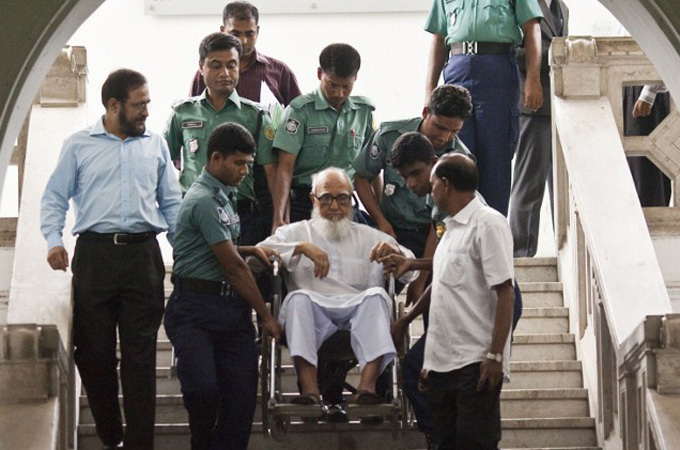The death in custody of elderly, former Jamaat-e-Islami leader Ghulam Azam, creates more tension in Bangladesh.
Speaking to Al Jazeera, his son, Salman Al Azami said: “Every person has the right to a dignified death, he has been ill for such a long time, the fact that he wasn’t allowed to spend his last days with his loved ones is very saddening.”
Azam’s funeral took place on Saturday, in Dhaka, with hundreds of thousands of mourners paying their respects. Separate memorials were held in cities across the world, with prominent scholars including Yusuf al-Qaradawi leading prayers for the figurehead.
A major figure both inside and outside Bangladesh, Azam was the leader of one of the most prominent Islamic parties internationally. He began his rise to prominence at a young age as an active and inspirational figure in political and religious circles. He was at the head of Jamaat-e-Islami from 1969 to 2000, founding the Bangladeshi wing of the influential party.
Born and educated in Dhaka, he read political science at university and held a prominent voice across the Muslim world as a religious thinker and author, writing over 100 works.
Yet, due to the stance of Jamaat-e-Islami during the nation’s independence struggle he remained a controversial figure in his beloved home country. Jamaat-e-Islami sided with Pakistan and opposed the break-up of the post-colonial “Muslim” state, making them feared outsiders to the political system they wished to influence. Official figures say 3 million Bengalis lost their lives during the war and deep wounds from the war have remained open.
Azam was arrested in January 2012 by Bangladeshi courts established to ostensibly try “war criminals” for alleged crimes committed during the nation’s struggle for independence in 1971. The International Crimes Tribunal issued indictments for Azam and other prominent figures from within Jamaat-e-Islami including Delwar Hussain Sayeedi; the arrests were met with outrage and following their convictions, violent protests broke out on the streets of Bangladesh.
In July 2013, he was found guilty of more than 60 counts of crimes against humanity for atrocities committed during the 1970s and subsequently sentenced to 90 years in jail. The prosecution had sought the death penalty but due to his age, he was given the prison term.
Azam’s supporters and family have always maintained his innocence accusing the court of aiming to remove political opposition to the government.
Toby Cadman, the legal representative for Azam, told Al Jazeera: “The indignity of being detained in such circumstances following a trial which breached all domestic and internationally recognised standards cannot be underestimated. The current Awami League government has corrupted this process and made it a tool of political revenge.”
Several human rights organisations and international legal figures have raised objections to both Azam’s convictions and the original court proceedings.
Human Rights Watch released a statement at the time of his conviction stating: “The trial of Ghulam Azam, the former chief of Bangladesh’s Jamaat-e-Islami party, at Bangladesh’s International Crimes Tribunal was deeply flawed and did not meet international fair trial standards.”
In his appeal Azam’s legal team argued that a number of the witnesses used by the prosecution were unreliable.
Azam is the second Jamaat-e-Islami leader to have died in custody. Abdul Quader Molla, the former assistant secretary-general of the party was executed in December 2013 amid international calls to halt the execution.
The British and European spokesperson of Jamaat-e-Islami, Abu Bakr Molla, told Al Jazeera: “The ICT will not have a legacy of justice, its legacy will be one of state sponsored murder when considering the case of Abdul Quader Molla, and one of a flagrant denial of justice and politically motivated revenge when considering the case of Azam.”
The International Crimes Tribunal in Bangladesh was intended as a means of closure to a bloody episode in Bangladeshi history. However, Azam’s death, as an elderly and much loved religious figure, in prison, means there are now fresh wounds to contend with.
Source: Aljazeera










